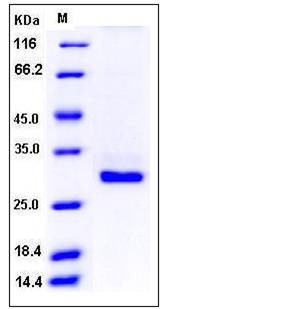Mouse CRP / C-Reactive Protein (His Tag)
AI255847
- 100ug (NPP2707) Please inquiry
| Catalog Number | P50409-M08H |
|---|---|
| Organism Species | Mouse |
| Host | Human Cells |
| Synonyms | AI255847 |
| Molecular Weight | The secreted recombinant mouse CRP consists of 216 amino acids and has a calculated molecular mass of 24.4 kDa. As a result of glycosylation, the apparent molecular mass of rmCRP is approximately 30 kDa in SDS-PAGE under reducing conditions. |
| predicted N | Glu 21 |
| SDS-PAGE |  |
| Purity | > 94 % as determined by SDS-PAGE |
| Protein Construction | A DNA sequence encoding the mouse CRP (NP_031794.3) (Met 1-Ser 225) was expressed, with a C-terminal polyhistidine tag. |
| Bio-activity | |
| Research Area | Developmental Biology |Metabolism |Types of disease |Metabolism in Metabolic disorders |
| Formulation | Lyophilized from sterile PBS, pH 7.4 1. Normally 5 % - 8 % trehalose and mannitol are added as protectants before lyophilization. Specific concentrations are included in the hardcopy of COA. |
| Background | C-reactive protein (CRP) is synthesized by the liver in response to factors released by fat cells. It is a member of the pentraxin family of proteins. The levels of CRP rise in response to inflammation. Human C-reactive protein (CRP) is the classical acute phase reactant, the circulating concentration of which rises rapidly and extensively in a cytokine-mediated response to tissue injury, infection and inflammation. Serum CRP values are routinely measured, empirically, to detect and monitor many human diseases. However, CRP is likely to have important host defence, scavenging and metabolic functions through its capacity for calcium-dependent binding to exogenous and autologous molecules containing phosphocholine (PC) and then activating the classical complement pathway. CRP may also have pathogenic effects and the recent discovery of a prognostic association between increased CRP production and coronary atherothrombotic events is of particular interest. |
| Reference |
